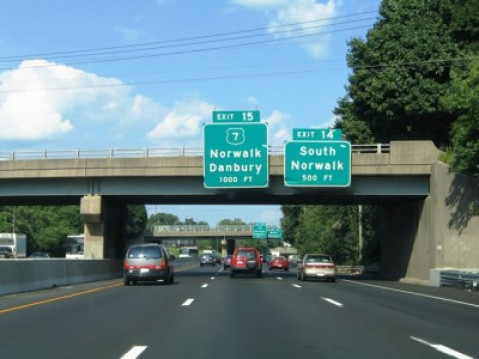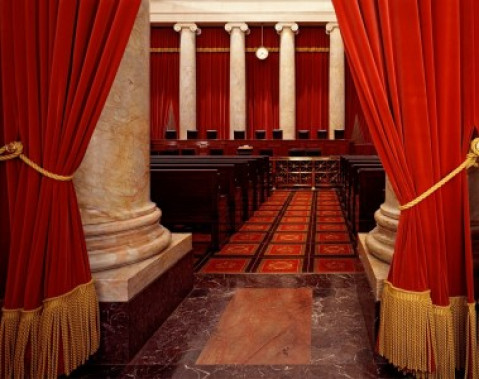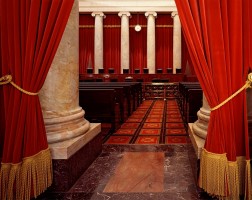Widgetized Section
Go to Admin » Appearance » Widgets » and move Gabfire Widget: Social into that MastheadOverlay zone
When A Tribe’s Driver Is at Fault…
The views expressed are those of the author and do not necessarily reflect the views of ASPA as an organization.
By Jason Bowns
May 5, 2017
William Shakespeare raised the issue in his The Life of King John. There, Pembroke philosophizes, “When workmen strive to do better than well, they do confound their skill in covetousness; and oftentimes excusing of a fault doth make the fault worse by the excuse…”
Only days ago, the U.S. Supreme Court released its decision in Lewis et al. v. Clarke. The core question was whether sovereign immunity applies if an employee works for a tribal government.
Brian Lewis was driving his car southward along Interstate 95 through Norwalk, a city along the Connecticut shoreline. Michelle Lewis sat in the passenger seat. Rear ending their car was William Clarke who was transporting Mohegan Sun patrons to their home. No one disputed Clarke was at fault; the question was whether or not he was legally liable for the damages.
Tort law revolves around remedying a civil harm. Plaintiffs must prove certain key elements to prevail on a claim for damages. First, there must be a duty defined in a variety of ways either imposed by a statute, contract or by a certain standard of care. Then there are the questions of causation – actual cause and proximate cause. Did the breach actually cause and proximately cause the harm to occur? Finally, was there harm and how much?
Based on that analysis, a claim for damages is then calculated. Tort cases involving employees may invoke the question of respondeat superior which means an employer can also be liable. The reasoning is that employees are just acting as agents of the principal.
It was undisputed Clarke was at fault in causing the accident. Nevertheless, he asserted a suit against him was actually a suit against the Mohegan Tribal Gaming Authority, an arm of the Mohegan tribe. He was a driver bringing patrons home in a casino owned limousine after all.
The doctrine of sovereign immunity means that a government can’t be sued unless it waives immunity. Because the Lewises filed their lawsuit in Connecticut Superior Court, Clarke asserted the Mohegan tribe was actually being sued, violating its sovereign immunity.
The trial court agreed with the plaintiffs, however, deciding the lawsuit was against Clarke as an individual and not against him as an agent of the Mohegan tribe. That made him personally liable for any damages. The casino itself was not being sued. Clarke appealed the decision, and the Connecticut Supreme Court ultimately sided with him.
The highest state court in Connecticut declared in a unanimous decision, “We conclude that the doctrine of tribal sovereign immunity extends to the plaintiffs’ claims against the defendant because the undisputed facts of this case establish that he was an employee of the tribe and was acting within the scope of his employment when the accident occurred.”
Accepting a writ or certoriari filed by the Lewis plaintiffs, the U.S. Supreme Court unanimously disagreed and completely reversed the Connecticut Supreme Court. Justice Sonia Sotomayor explained, “In ruling that Clarke was immune from this suit solely because he was acting within the scope of his employment, the court extended sovereign immunity for tribal employees beyond what common-law sovereignty principles would recognize for state of federal employees.” She went on, noting that “The protection offered by tribal sovereign immunity here is no broader than the protection offered by state or federal sovereign immunity.”
The opinion restates that the Connecticut judiciary exercises no authority over Mohegan Sun or the Gaming Authority. It’s just a forum to hold the driver individually accountable for the vehicular accident he caused. Sotomayor wrote, “When Clarke is sued in his individual capacity, he is held responsible only for his individual wrongdoing.”
This precedent is binding not only in Connecticut but everywhere across America. Rather than abridging tribal sovereignty, it declines to expand upon it. To do so is inconsistent with parallel actions filed against state and Federal employees. That was a key public policy concern.
William Clarke sought to use tribal sovereign immunity as a shield to defend himself from liability. By holding that he can still be individually liable for negligent conduct, the Lewis plaintiffs can now receive some relief as a matter of equity in law. It also serves as an added deterrent for other tribal employees who may otherwise engage in tortious conduct. Moreover, it reaffirms the balance of sovereign authority between state, federal and tribal authorities.
Yet how could those three different courts reach such disparate conclusions? French philosopher Michel Foucault reminds us, “Justice must always question itself, just as society can exist only by means of the work it does on itself and on its institutions.” Perhaps there’s more virtue in disagreement and a substantive dialog than what is spurred on by rushed consensus.
With that, the highest court in the land adds a new page to the annals of American tribal policy.
Author: Reared in rural Connecticut, Jason Bowns earned a Bachelor of Arts degree from New York University, majoring in Classical Civilization and Hellenic Studies while minoring in Politics and Social Studies Education. He earned his Master of Public Administration degree at John Jay College of Criminal Justice, honing essential skills to detect organizational fraud, waste, and abuse. He’s reachable at [email protected].








 (2 votes, average: 4.50 out of 5)
(2 votes, average: 4.50 out of 5)
Roderick Bell
May 5, 2017 at 1:44 pm
Jason, thanks for an informative and sound article on an interesting case in this era of devolution.